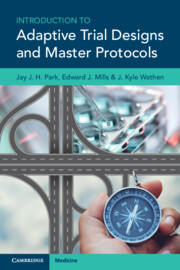Book contents
- Introduction to Adaptive Trial Designs and Master Protocols
- Introduction to Adaptive Trial Designs and Master Protocols
- Copyright page
- Content
- Preface
- About the Authors
- Part I Introduction and History of Clinical Trial Research
- Part II Basic Ingredients for Adaptive Trial Designs and Common Types
- Part III Basic Ingredients for Master Protocols
- Chapter 6 Characteristics and Principles of Master Protocols
- Chapter 7 Platform Trials
- Chapter 8 Basket Trials and Umbrella Trials
- Part IV Case Studies of Adaptive Trial Designs and Master Protocols
- Part V A Practical Guide to Adaptive Trial Designs and Master Protocols
- Index
- References
Chapter 6 - Characteristics and Principles of Master Protocols
from Part III - Basic Ingredients for Master Protocols
Published online by Cambridge University Press: 20 March 2023
- Introduction to Adaptive Trial Designs and Master Protocols
- Introduction to Adaptive Trial Designs and Master Protocols
- Copyright page
- Content
- Preface
- About the Authors
- Part I Introduction and History of Clinical Trial Research
- Part II Basic Ingredients for Adaptive Trial Designs and Common Types
- Part III Basic Ingredients for Master Protocols
- Chapter 6 Characteristics and Principles of Master Protocols
- Chapter 7 Platform Trials
- Chapter 8 Basket Trials and Umbrella Trials
- Part IV Case Studies of Adaptive Trial Designs and Master Protocols
- Part V A Practical Guide to Adaptive Trial Designs and Master Protocols
- Index
- References
Summary
In this chapter, we discuss the key concepts, terminologies, and principles of master protocols. The term ‘master protocol’ is often misunderstood and misused. This term refers to a single overarching protocol document that is developed with the intention of evaluating multiple interventional hypotheses. ‘Master protocol’ itself does not refer to a specific type of clinical trial. There are three types of clinical trials that are conducted using the master protocol framework: platform trials, basket trials, and umbrella trials. While master protocols can naturally extend to adaptive trial designs, the use of adaptive trial designs is not a defining feature of master protocols nor of platform, basket, and umbrella trials. Master protocols implement common screening, trial systems, and standardised operating procedures across multiple trial institutions under one centralised governance model. In addition to statistical efficiencies, operational efficiencies can be gained by adopting the master protocol framework.
Keywords
Information
- Type
- Chapter
- Information
- Publisher: Cambridge University PressPrint publication year: 2023
